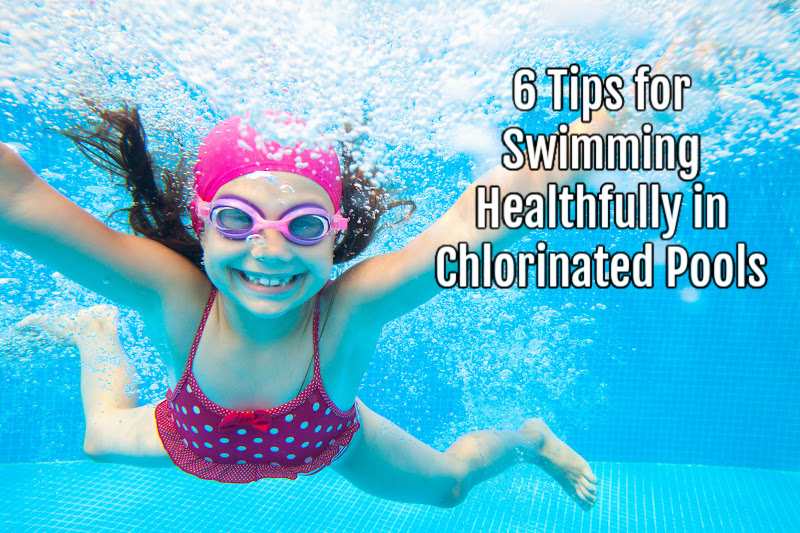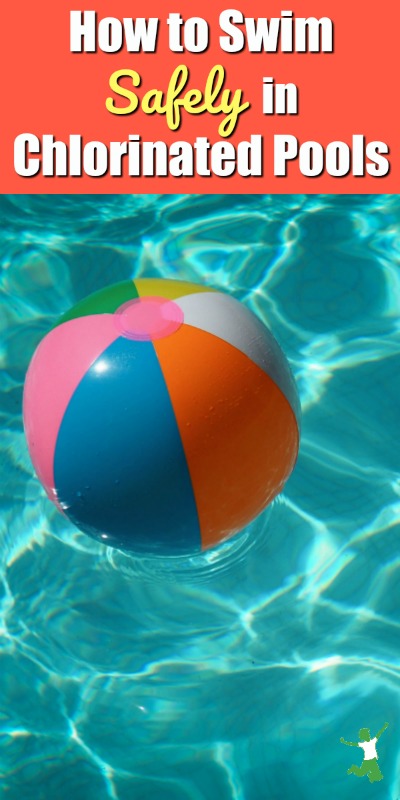The reasons why swimming in chlorinated pools is dangerous to health and the 6 steps to take to protect yourself and your family while still enjoying water fun all summer long.

The reasons why swimming in chlorinated pools is dangerous to health and the 6 steps to take to protect yourself and your family while still enjoying water fun all summer long.
An important topic to explore as we head into the summer season is chlorinated pools.
Chlorine is popular because it handles the three main jobs in keeping a swimming pool clean: It sanitizes (kills bacteria and germs), oxidizes (controls organic debris from perspiration and body oils), and deters algae. The chemical is unpopular, however, because it has a strong odor, reddens eyes, causes allergic reactions in some swimmers, and is a known carcinogen – meaning it has been linked to cancer!
Chlorine absorbs into your skin. Too much exposure to chlorine has been linked to major health problems including reproductive disorders and even birth defects. It can cause your skin and hair to dry out and over time too much exposure can even cause wrinkles.
Editor’s Note: Have you ever wondered why Olympic swimmers seem to have so many wrinkles at such young ages and most of the men start losing their hair so quickly? Could it, in fact, be caused by overexposure to chlorine for so many years and so many hours every day? Perhaps so.
When chlorinated pools are indoors, toxic gases such as nitrogen trichloride are released, which can be very dangerous. When we breathe in this gas it can cause severe damage to the lining of the lungs which could lead to respiratory problems or asthma. This toxic gas can be harmful at any age yet it poses the most risk to elderly people and small children.
So while chlorine used to disinfect swimming pools is widely recognized as a health hazard, not everyone has access to the ocean or a lake, or pools treated with ozone, ionizers, bromine, silver-cooper, or other alternatives which can frequently be much more expensive.
6 Tips to Protect Health in Swimming Pools
If you or your family members do choose to swim in chlorinated pools, some recommendations I’ve read are to:
1. Swim in outdoor chlorinated pools only if at all possible. It is much safer because the toxic gases are mostly eliminated in the open air.
2. Swim in chlorinated pools occasionally. It is regular exposure to chlorinated pools that presents the greatest risk to health.
3. Shower immediately before and after using a natural Castile soap.
4. Drink plenty of home-filtered water (better than bottled!) beforehand so that you are well hydrated.
5. Consider wearing a mask and snorkel to shield your eyes – and even a wetsuit, if you are willing to go that far!
6. Get fresh air afterward so you don’t continue to inhale the fumes, and can clear your lungs.
Why shower immediately before swimming in a chlorinated pool?
Julie Deardorff explains in her article published in the Chicago Tribute, “Another important reason to shower is that our bodies generally contain residue from consumer products, including perfume, make-up, body lotion, shampoo, and sunscreen.
When the chemicals used to disinfect the pool mix with organic matter (sweat, hair, urine) or nitrogen-rich substances (commonly found in consumer products) it can create a more toxic agent, said Michael Plewa, a professor of genetics at the University of Illinois whose new research has linked pool chemicals to health problems, including asthma and bladder cancer.”
Red, burning, itchy eyes and skin?
What I’ve read is that the presence of chloramines can cause reactions such as red, burning, irritated eyes: Chloramines form when chlorine reacts with ammonia. Ammonia enters the pool through sweat and urine. It is important to teach children not to urinate in pool water [even though it is chlorinated].
Also, showering before swimming can remove excess sweat that interacts with chlorine. My understanding is that if the sweat is on your skin, and hasn’t been rinsed off first in the shower, the chlorine will interact with the sweat on your skin as you enter the pool, and may result in some folks getting itchy skin.
So, what do you think? Do the benefits and joy of swimming and playing in a pool outweigh the health risks of chlorine?

Additional articles on this topic
The Dangers of Chlorine
Asthma In Swimmers
Swimming Pools May Increase Cancer Risk
The Hidden Danger of Swimming Pools
Swimming Pool Alternatives to Chlorine
Water Birth Dangers








Great post and very well explained. I believe in professionals so this is a very useful post for everyone. Many thanks for sharing.
Are salt water pools a healthy alternative? Or is that salt just turned into chlorine? I don’t really know how the process works, and if the end result is healthier or not.
From my understanding, salt water pools are still chlorinated, but the level of chlorine is much lower.
yeah,..this is correct…i dont usually allow my kids to swim indoors…its just that the experience swimming under the sun is so much different than the later.
Awesome information
There are new ways of filtering pool water without chemicals in guess
what are indoor swimming pools? please explain as much as possible
Thanks for this article, the chlorine is a huge problem and it’s plagued my life.
I’ve been swimming for close to three decades and my sensitivity to chlorine actually increased over time to the point where I developed eczema. I also don’t want something to mask the smell, I needed to wash off the chlorine. In my research to allow to me to swim, I found Swimmer Soap, it’s an all natural bar soap. I’ve used it for a few months and it definitely washes out the chlorine and my eczema has slowly faded away. I think it’s more important for children to properly wash off chlorine due to long term effects from cumulative exposure. You don’t want to address the issue when it’s too late. Hope this helps.
Interesting facts here, but none of these bad symptoms have happened to me before. I have been on a swim team for four years. I like to swim 4/5 days a week. It would be interesting to see your sources.
very informative, thanks for sharing!
i started swimming at Walden Pond in Concord Massachusetts this past June. This experince has reminded me how many hours I played at the beach as a child. and realized I had denied myself the experience for years. So now the winter is upon us and I have joined the local YMCA., mainly for the pool. I have swam twice, the day I joined and today, the day after. I have always had issues with my skin, I get itchy in different spots, for no apparent reason nd at no particular time or during or after an activity. Needless the say, I usually dont shower everyday because of this. Now, I need to take a shower prior to my swim, then after to get that horrid smell off my skin. Today, I even took a shower once I got home, meaning I took three showers today and swam for about a half hour in a heavily chlorinated pool. I am itchy. I know all the suggestions, and I do them to keep hydrated. If I could still swim at the pond, I would, believe me. I actually am not looking forward to depending on an indoor pool for about half the year. I felt the chlorine effecting my breathing, when water went up my nose, it burned and I can tell my body hates it.